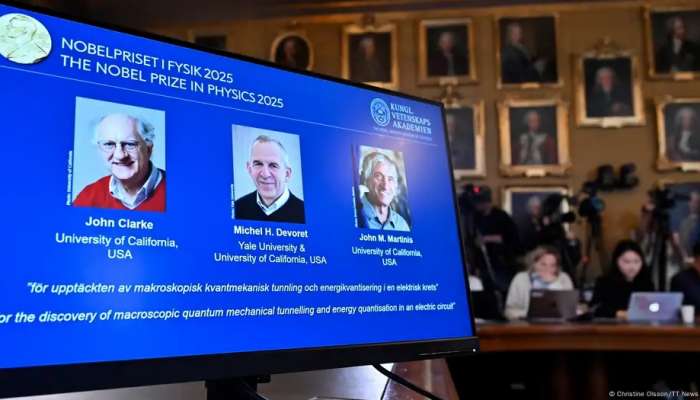
Stockholm: A trio of US-based scientists, John Clarke of the UK, Michel Devoret of France, and John Martinis of the US, have won the Nobel Prize in physics for their work in the field of quantum mechanical tunnelling, the Royal Swedish Academy of Sciences announced in Stockholm on Tuesday.
Why was the prize awarded?
The prize was awarded for "the discovery of macroscopic quantum mechanical tunnelling and energy quantisation in an electric circuit," according to the award-giving body.
"This year's Nobel Prize in Physics has provided opportunities for developing the next generation of quantum technology, including quantum cryptography, quantum computers, and quantum sensors," it said in a statement.
On the Nobel Prize account on X, formerly Twitter, it was explained that the scientists' "experiment took quantum mechanical effects from a microscopic scale to a macroscopic one."
The scientists carried out experiments in the mid-1980s with an electronic circuit built of superconductors. The experiments showed that quantum mechanical properties could be made concrete on a much larger scale.
Last year, the prize was won by John Hopfield and Geoffrey Hinton, two artificial intelligence researchers who helped create the basis for machine learning.
Other past winners of the prize include Albert Einstein, Pierre and Marie Curie, Max Planck and Niels Bohr, a pioneer of quantum theory.
One of the three winning scientists, John Clarke, who led the research, told reporters by phone that the announcement of his and his colleagues' win was "to put it mildly, the surprise my life."
Clarke praised the other two laureates for making "overwhelming contributions" to the research, which he said formed a basis, for example, for the functioning of cellphones.
Nobel Prize Week is underway
On Monday, the Nobel Prize in medicine, the first Nobel to be awarded this year, went to a trio of scientists — Mary E. Brunkow, Fred Ramsdell and Dr. Shimon Sakaguch — for their work and discoveries in the field of immune system research.
Further Nobel announcements to be made this week are the chemistry prize on Wednesday and the literature prize on Thursday.
The Nobel Peace Prize will be announced on Friday, while the winner of the Nobel Memorial Prize in economics — which is not one of the original five prizes established by Alfred Nobel, the inventor of dynamite, in his will and was first presented in 1969 — will be revealved on October 13.
The award ceremony will be held on December 10, the anniversary of the death of Nobel, a Swedish industrialist who amassed a fortune through his discovery, in 1896.
In addition to their considerable prestige, the prizes bring their winners cash to the tune of 11 million Swedish kronor (nearly €1.03 million; $1.2 million), a sum that is shared between winners if there are several of them.